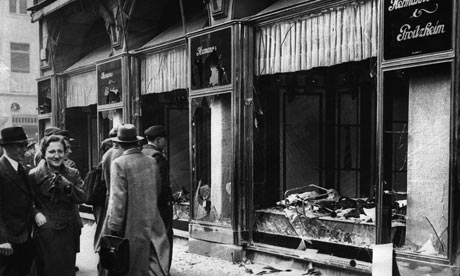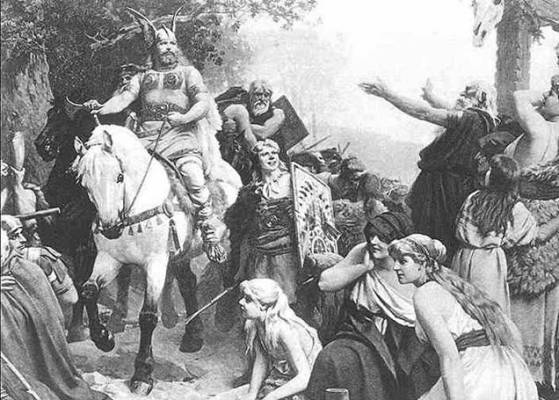During
the hardships in Germany, the cruelest time was probably during the Third
Reich. The cruelties practiced by the Germans over the Jews in Nazi Germany
were one of the worst remembered. When looking back in the past, especially
when visiting Berlin, you can still see a lot of evidence that there was a war
there, and that there was a lot of bad things that happened. There are bullet
holes still in buildings and even on the news every once in a while, you hear
them talk about finding a hidden bomb are something back from that day that
never detonated. The holocaust stands out so vividly because it was so recent,
and it was a very tragic event.
The
Nazi Party was attractive to the majority of the German people because Hitler
and his part proposed a solution to nearly every problem that was facing the
various segments of the population. According to history, one example was given
that the Nazi Party agenda addressed the problem of Germany’s loss of WWI.
There was a myth going around that Germany’s the Weimar Republic’s first
politicians stabbed army in the back. In that way, they seemed to have brain
washed the Germans into believing that the loss of the war with Democracy.
One
goal, the Nazi’s wanted to abolish the Treaty of Versailles. This treat was designed
to humble Germany. Germany was required to abolish compulsory military service,
pay a fine in reparations, relinquish its colonial lands and assume complete
responsibility for starting the war. The Germans did not like this treaty. To
every German, the idea of tearing the treaty up would bring a sense of
empowerment and elation.
In
many speeches during the rise of Hitler, he often spoke about the treasonous
attitude of the Weimar government with its policies of fulfilling the treaties
terms. On February 24, 1920, Hitler spoke and had his first meeting. The first
point addressed the concept of a unified Germany enjoying self-determination.
The second point on the Treaty of Paris, they demanded equality of rights for
the German people in its dealings with other nations, and the abolition of the
Peace Treaties of Versailles. The Nazis put themselves in a position where they
would ensure the German people a way to build back their nationalistic pride
and remove the knife from the army’s back. Without the treaty, Germany could
rebuild their military, which had always played a major role in the country’s
identity.
After
World War I, Germany faced extreme economic hardships. The extreme poverty of
the time caused hardship in rural communities among farmers. Much of the
village life was filled with community and people helping one another. The
harder it became financially, the more the communities began to break down.
 The
Nazi Party combined the issues of Germany’s betrayal in WWI, the treaty of
Versailles, and the Weimar Republic’s ineptness at handling the economy,
national unity, and fear of Marxism, anti-Semitism and the German people’s
ethnic identity into a masterfully crafted propaganda package. Its aim was to
work on the German people’s fears and hopes until they were mesmerized by the
Nazi ideology. Hitler’s true genius laid in his ability to use propaganda like
a surgeon’s scalpel. He knew how to target specific groups and appeal to them
on an emotional level. Germany was a nation with a damaged pride and a very
unhealthy economy. I believe the German’s were desperate to find a way out to
get their freedom. I believe that they were brainwashed by Hitler, and because
the Germans wanted to get rid of the Weimar Republic, they were willing to
believe anything to get their freedom. I am not sure if they knew what they
wanted, and during Hitler’s reign, they changed for the worse, possibly because
fear, or because they liked Hitler. Then back to the Unification, people were
called Germans, but they people still considered themselves as individuals.
Like when the Berlin wall came down, I am not sure if a lot of the East or West
Germans wanted to change sides or not. In conclusion, the Germans had it rough,
and followed who was more powerful, but
I feel they came to their senses in the end.
The
Nazi Party combined the issues of Germany’s betrayal in WWI, the treaty of
Versailles, and the Weimar Republic’s ineptness at handling the economy,
national unity, and fear of Marxism, anti-Semitism and the German people’s
ethnic identity into a masterfully crafted propaganda package. Its aim was to
work on the German people’s fears and hopes until they were mesmerized by the
Nazi ideology. Hitler’s true genius laid in his ability to use propaganda like
a surgeon’s scalpel. He knew how to target specific groups and appeal to them
on an emotional level. Germany was a nation with a damaged pride and a very
unhealthy economy. I believe the German’s were desperate to find a way out to
get their freedom. I believe that they were brainwashed by Hitler, and because
the Germans wanted to get rid of the Weimar Republic, they were willing to
believe anything to get their freedom. I am not sure if they knew what they
wanted, and during Hitler’s reign, they changed for the worse, possibly because
fear, or because they liked Hitler. Then back to the Unification, people were
called Germans, but they people still considered themselves as individuals.
Like when the Berlin wall came down, I am not sure if a lot of the East or West
Germans wanted to change sides or not. In conclusion, the Germans had it rough,
and followed who was more powerful, but
I feel they came to their senses in the end. 













